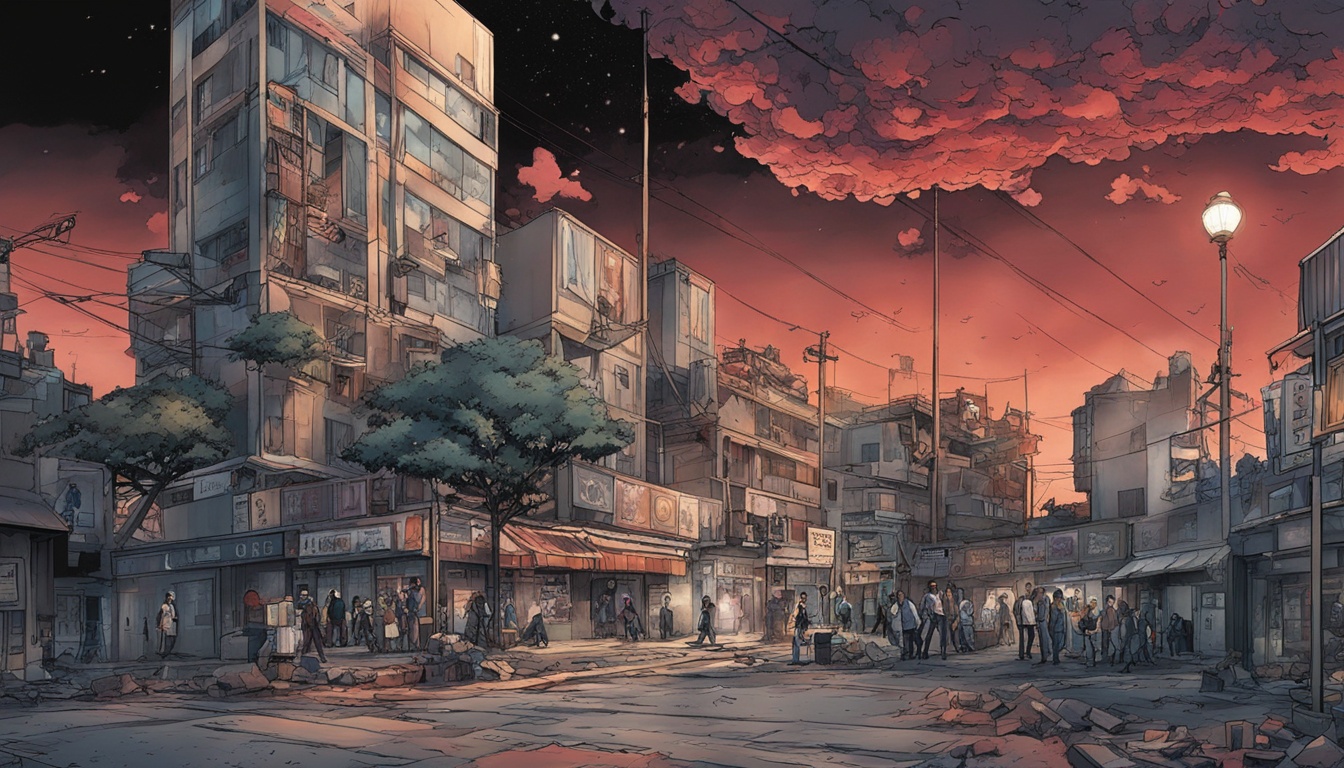Did you know that 70% of the most socially conscious anime and manga feature female leads? This stat shows anime’s ability to dig deep into social issues. It uses unexpected stories to talk about what it means to be human and our lives today.
Some people see anime as just fun. But, series like Neon Genesis Evangelion and Ghost in the Shell tackle big issues. They show societies broken by those in charge. These stories are like a clear mirror, reflecting our own real-life problems.
Anime and manga with deep messages grab people of all ages. They talk about tough topics like mental health and racism. By mixing fantasy with real-life issues, these stories touch our hearts in unique ways.
### Key Takeaways
- Anime and manga with social commentary offer thought-provoking narratives that explore a wide range of societal issues.
- These works often utilize surreal or fantastical settings to convey their messages, allowing creators to blend social critique with imaginative storytelling.
- The medium’s versatility enables it to connect with diverse audiences, addressing complex real-world problems through the lens of fiction.
- Anime in particular has emerged as a powerful platform for social commentary, pushing the envelope in presenting societies plagued by corruption and human nature.
- Many of the most socially conscious anime and manga feature female protagonists, contributing to a more diverse representation in the genre.
Introduction to Social Commentary in Anime and Manga
Many think anime doesn’t tackle social issues, but they’re wrong. In fact, most media reflect our world, showing views and interests. Yet, anime often leans towards idealism and fantasy over reality. Still, there are some shows that dive into real-world problems, making them stand out.
Surrealist Narratives with Deeper Meanings
Social commentary varies in anime, from subtle to clear. Some shows mix real-world issues with fantasy or supernatural elements. This approach helps make social messages engaging, even if they’re not always obvious.
Anime’s Versatility in Articulating Social Critiques
What makes anime great at social commentary is its versatility. It can speak to many people through different storylines and characters. By using surrealist and imaginative storytelling, anime tackles deep societal issues in unique ways.
Neon Genesis Evangelion: A Bleak View of Future Society
In 1995, the anime Neon Genesis Evangelion showed us a post-apocalyptic Tokyo. Here, most of humanity was wiped out by the ‘Second Impact,’ a nuclear disaster. This event was caused by an experiment with a powerful alien being.
This show focuses on a society trying to pick up the pieces after near destruction.
Dystopian Mecha Society Plagued by Corruption
The anime features giant robots named Evas. They were built to protect Earth from powerful creatures called Angels. Children are forced to pilot these Evas, being pushed into a dark and dangerous world.
Many see this story as a grim version of our own future. It brings up big topics like the harsh realities of dealing with challenges and redemption.
Children as Pawns of War
The story shows how society can treat its young not as future but as tools for war. Children, in this context, are used as mere pawns, sometimes even as weapons themselves.
The authorities claim to look out for their people. But they make cold, heartless choices that put everyone, especially the young, in dangerous situations.
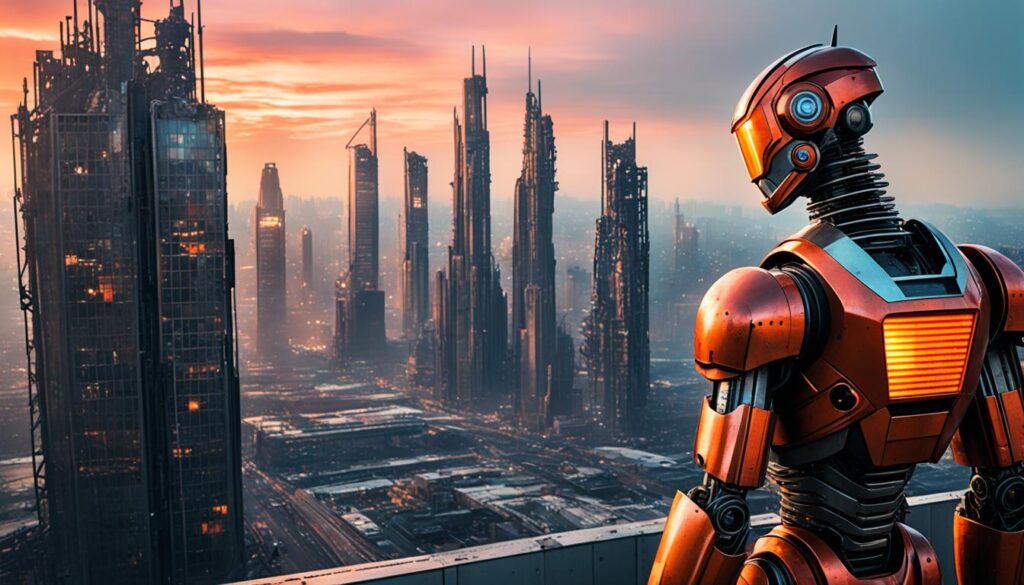
Ghost in the Shell: Questioning the Definition of Humanity
The 1995 anime, Ghost in the Shell, is a key work in popular culture. It’s based on Masamune Shirow’s manga and has been important for 22 years. The story’s roots are in Japanese science fiction and reflect the post-war period. It’s also influenced by the technological innovations of the 1980s and 90s. These include the cyberpunk, mecha, and mahou shoujo genres. They were part of a narrative transformation known as henshin būmu.
Technology Blending with Human Bodies
In Ghost in the Shell‘s world, people merge with technology to enhance themselves. This process allows tampering, leading to hacking. Technological humans’ memories can be altered by hackers. The movie uses ‘ghost’ for the soul and ‘shell’ for the enhanced body. Some choose to fully embrace technology, leaving their human side behind.
Identity Crisis of the Cyborg Protagonist
Kusanagi, the main cyborg character, straddles two worlds: human and machine. She struggles with her identity, representing the movie’s core theme about humanity. The movie urges viewers to think about what makes us truly human.
The Ghost in the Shell series sets its stories in 2029, in a high-tech, connected world. It introduces the idea of a ‘ghost’ as a person’s consciousness. This is different from a physical robot.
The narrative of Ghost in the Shell explores the fluidity of identity and self. It does so by examining the relationships between body, mind, and soul. This deep dive raises questions about humanity and the soul, especially with cyborg figures.
Code Geass: Exposing the Weakness of Human Willpower
Many think they are above being controlled by evil forces. But, the truth is, the human mind can be easily swayed. Code Geass shows this by telling the story of Lelouch Lamperouge. He fights against the empire Britannia, but his actions take a turn.
Lelouch gains access to powerful mechas and lets the power change his initial aim. In the end, he becomes a threat just like the empire was. This change in him shows how fragile human willpower really is.
| Character | Age | Height | Roles and Ranks | Knightmare Frames | Voice Actors | Ranking |
|---|---|---|---|---|---|---|
| Suzaku Kururugi | 17 (Season 1), 18 (Season 2) | 176 cm (5’9⅝”) | Zero, Knight of Zero, Knight of Seven (Promoted), Honorary Britannian, Knight of Princess Euphemia, Personal Knight of Prince Schneizel, Soldier, Private, Warrant Officer, Major, Knight of the Round | Lancelot, Lancelot Albion | Takahiro Sakurai (Japanese), Yuri Lowenthal (English), Davide Perino and Mattia Nissolino (Italian), Konrad Bösherz (German) | 6th in the 29th Anime Grand Prix with 143 votes |
In Code Geass, Suzaku Kururugi exemplifies how a person’s willpower can bend. He once aimed to protect the innocent but shifts his focus after a tragedy. This evolution shows how even the strongest ideals can wane in the face of personal loss.
“Suzaku reflected within the crater he created after the Tokyo Settlement’s destruction, realizing the true extent of the devastation caused by Lelouch’s Geass command.”
The story unfolds to reveal how power and corruption affect morally upright people. Suzaku, striving for a high position, sacrifices his principles. He agrees to a deal that goes against what he initially believed.
At its heart, Code Geass is a warning about the human mind’s weakness. It warns against the false sense of invincibility some may feel. Anyone, no matter how resolute, can fall to the sway of evil.
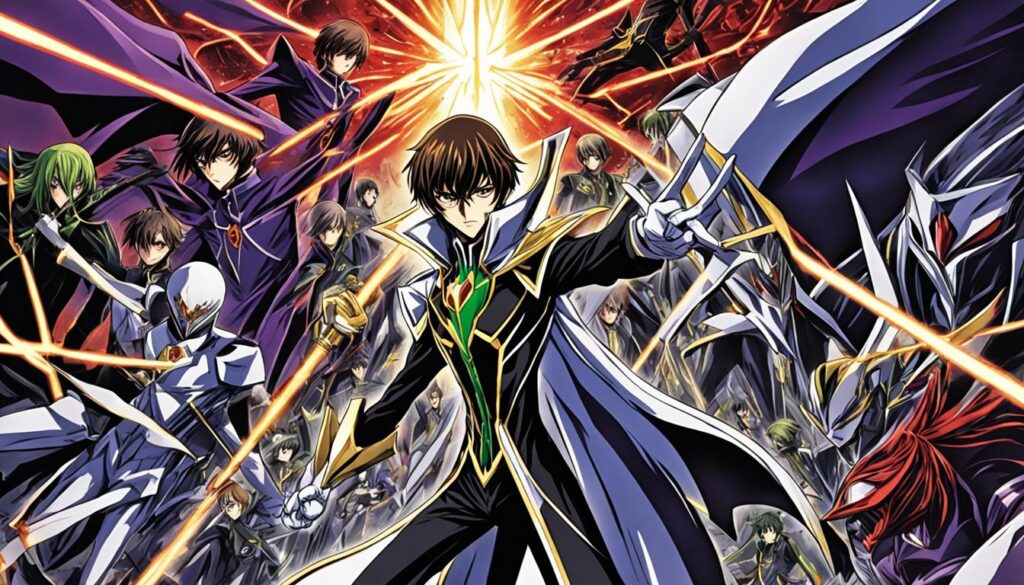
Welcome to the N.H.K.: Exploring Mental Illness and Isolation
Welcome To The N.H.K. tells the story of Tatsuhiro Satou. Tatsuhiro is a hikikomori, living in fear of the N.H.K. broadcasting company. He thinks they’re behind everything, controlling the world. The anime mixes dark comedy with deep messages, shedding light on the struggles of living with mental illnesses like anxiety and depression.
Portrayal of Anxiety and Depression
Characters like Hitomi and Misaki struggle with their mental health. Hitomi falls into a deep despair, leading her to try and take her own life. On the other hand, Misaki attempts suicide twice but also works with Tatsuhiro to end their lives four times. Hitomi turns to alcohol and drugs to escape her depression. Megumi, faced with a mountain of debt, turns to manipulating others as she loses her empathy.
Critique of Isolation in Japanese Society
Welcome To The N.H.K. also heavily critiques the problem of isolation in Japanese society. While the causes of this isolation are complex, the show offers some insights. Produced by Gonzo in 2006, it’s based on a novel from 2002 by Tatsuhiko Takimoto. This story was so well-loved that it got a manga in 2004. With 24 episodes, the series has a strong fan base and critics have given it high marks. You can watch Welcome to the N.H.K. on Crunchyroll.
Death Note: Experimenting on Morality
Death Note stands out as a top anime for many. It’s not just about a thrilling story. The anime dives deep into the idea of morality and how we see it differently. The show is like a chess game where each move is about what each side thinks is right.
The story clashes the ideas of the police and a character named Light. They both want to stop crime but by very different methods. Light believes his actions are for the greater good, much like a god seeking to eliminate wrongdoers.
Psychological War of Subjective Morality
The heart of Death Note’s story is the battle between the police and Light Yagami. They both aim to make the world a better place but in truly different ways. This brings into light the debate on what true justice is and how far it should be pursued.
Light’s growing belief that he is doing the right thing warps his view of the world. He starts to see everyone who opposes him as obstacles to a perfect society. This mindset leads him to commit acts that many would consider wrong.
Light’s Pursuit of Warped “Justice”
A special notebook gives Light the power to kill by writing names. At first, he believes he’s doing good. But as he continues, his idea of justice turns darker. He ends up becoming the very thing he’s trying to rid the world of.

A Silent Voice: Tackling the Reality of Bullying
In 2017, the anime film A Silent Voice showed how bullying is complex, focusing on the bully. It tells the story of Ishida Shoya, a young man tormented by his past. He had bullied a deaf girl named Nishimiya Shoko, leading her to change schools.
When Nishimiya leaves, Ishida finds himself alone. No one wants to be his friend. This happens because his classmates isolate him due to his past actions.
Perspectives of Both Bully and Victim
The film illustrates Ishida’s struggles through unique visual storytelling. He sees X’s over people’s faces, showing his feelings of disconnect from others. This captures the deep mental battles on both sides of bullying, the bullied and the bully.
Mental Struggles and Social Isolation
The story shows the deep impact of bullying, not just on the bullied but also on the bully. Ishida faces social isolation after his bullying past is known. This commentates on the serious and far-reaching effects of bullying.
A Silent Voice encourages viewers to look deeper into bullying, seeing it as a complex issue. It highlights the need for empathy, redemption, and understanding for both the bullied and the bully.
Social Commentary
Terror in Resonance: Authentic Portrayal of Societal Chaos
Terror In Resonance shows a dystopian world much like our own. It is full of constant terrorism. The public lives in fear, thanks to bombings and attacks.
The anime focuses on corrupt systems, incompetent leaders, and media’s fear tactics. It also shows how people use social media to respond to these threats. The terrorists create a tense, cat-and-mouse scenario that mirrors real-world reactions well.
Tokyo Ghoul: Exploring Societal Ostracization
Tokyo Ghoul tells a story of ghouls, who are like humans but need to eat human flesh. It deals with their struggles and how they are treated by society. The show is heavy on issues like social exclusion and the dehumanization of minorities.
The main characters show how hard it is to fit in when people fear and shun you. This creates a deep comment on human nature and our constant struggle for acceptance in a chaotic world.
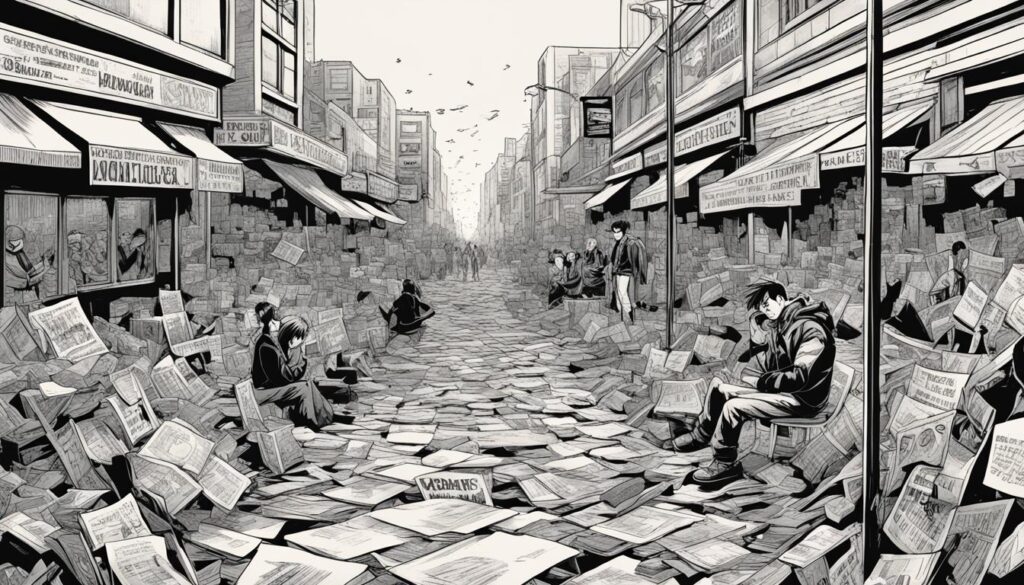
Attack on Titan: Addressing Fascism and Government Deception
In the world of Attack On Titan, people fight the monsters called Titans. But the story shows a dark truth. People can be as bad as the Titans. The very leaders urging trust are part of the problem. The military and politicians ignore the real danger that faces everyone.
Corruption and Ignorance of the Military
In Attack on Titan, the military is shown as twisted and blind to the outside world. Dot Pixis, like a historical general, shows this corruption. The government’s lies hide the Titans’ human origins, echoing how the Nazis used false stories.
Government’s Lies and Manipulation
The government in Attack on Titan tricks its people. It blames the Titans for bad things, not the government’s own actions. The Scouts are punished for trying to tell the truth. Those in power stop technology and news from spreading, holding onto control by lying.
Even with the government’s tight rule, characters like Historia fight against it. And Gabi changes her view to fight against prejudice. This anime looks into deep issues like government deception, corruption, fascism, and how people fight back. It’s not just about monsters; it’s about society and its problems.
My Hero Academia: Understanding Inequality in Society
At the start of My Hero Academia, Izuku reveals a hard truth: not everyone is born the same. This phrase is central to the story. It shows how the world treats people differently based on their quirks.
Society looks down on those without quirks. They’re seen as the worst by many.
Quirk Discrimination and Stereotypes
Discrimination against quirks is a major focus in My Hero Academia. It looks at how certain quirks lead to harsh stereotypes. For example, Eri is shunned for her dangerous powers.
Prioritizing Marketability over Character
In the hero world of My Hero Academia, what you can do is everything. How “sellable” your quirk is, and its power, are key. This means heroes like Bakugo, with exciting powers, do well. But those like Twice, who face challenges due to their quirks, find little help.
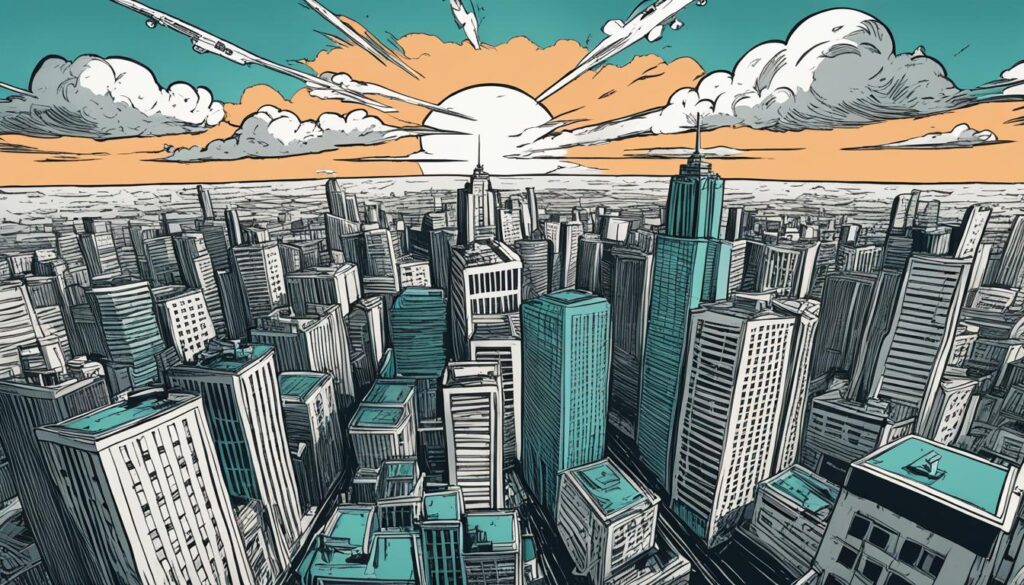
Exploring Diverse Social Issues through Fantastical Settings
Media often mirrors the world we live in. Anime, however, frequently shows idealistic or fantasy worlds. Yet, some anime tackle real issues and provide social commentary, making them stand out.
Mental Health and Identity Crises
Some anime talk about important issues in modern politics with a unique twist. Often, they include fantastical or supernatural elements. This approach can vary, from being clear and direct to more subtle but still crucial.
Discrimination and Geopolitics
Anime comes in many forms, addressing issues in modern politics with imaginative elements. This includes fantastical or supernatural twists. Even when less bold, these messages remain significant to the story.
Blending Social Commentary with Surreal Elements
Many think anime lacks social commentary, but that’s not true. Anime often reflects society through its creators’ and fans’ viewpoints. Yet, many anime shows focus more on fantasy and dreams, leaving out real-world problems. This is what makes anime that does include social commentary stand out.
Anime Movies as Vehicles for Social Critique
Anime movies are a great way to mix surreal elements with a story. You can add strange or futuristic things smoothly. This lets the audience use their imaginations freely, not bothered by bad acting or effects.
Exploring Societal Issues through Imagination
Anime movies combine social commentary and surreal elements in a special way. They offer a way to look at many societal issues. Works like “Atlanta” and “Get Out” use creative ideas to talk about real problems. They make us think more about our society and the way we live.
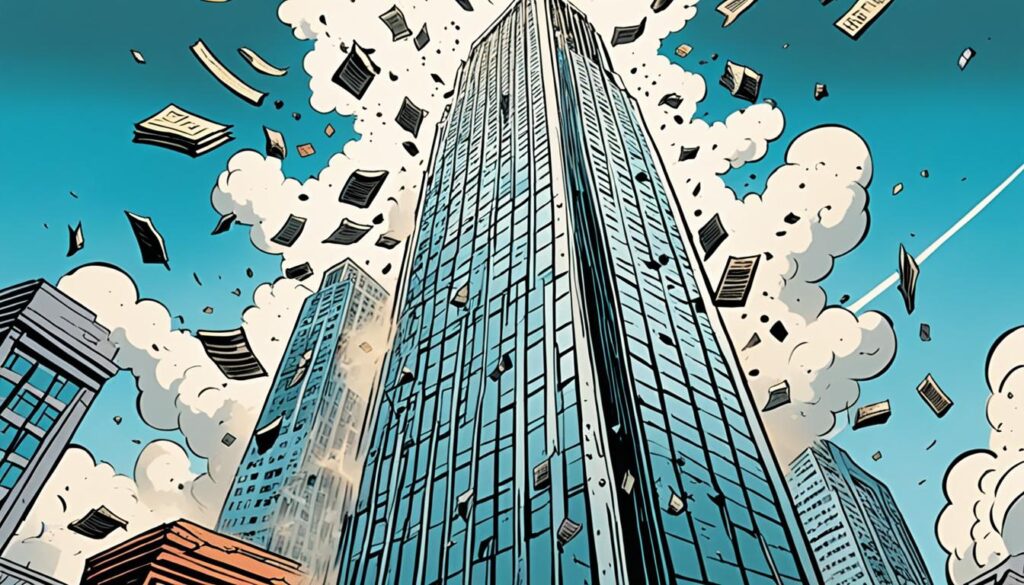
Conclusion
In closing, anime and manga offer tales that make us think about many big issues. Issues from mental health struggles to worldwide politics are covered. The stories often happen in unreal worlds, mixing hard messages with creative stories. By using fiction, these anime and manga show us the real world in a unique way. They give us a place to think and talk about real-life problems in a fun, engaging environment.
Not every anime and manga directly talk about these big issues. But, the way this art form reaches people from all walks of life is special. Both “Neon Genesis Evangelion” and “Ghost in the Shell” are great examples. They ask us to look at our own society’s faults and think about the future.
The anime and manga world is always changing. It’s interesting to see how creators will face new global issues. Mixing important messages with fun stories can really make people think. It encourages us to talk about and understand the problems we face today.
FAQ
What are some examples of anime and manga with strong social commentary?
Several anime and manga delve deep into societal issues. Among them are Neon Genesis Evangelion, Code Geass, and Welcome to the N.H.K. Also included are Ghost in the Shell and Death Note. Recent hits like Attack on Titan and My Hero Academia are also noteworthy.
How do these works use surrealist narratives and fantastical settings to explore real-world issues?
These mediums often combine surreal elements with social critique. Across genres, they dive into complex problems. This approach melds imaginative tales with deep societal explorations.
What types of societal issues are commonly addressed in anime and manga with social commentary?
They shed light on mental health, discrimination, and geopolitics. Plus, they tackle corruption and the impact of technology on humanity. These topics are presented through rich storytelling.
How does the versatility of the anime medium contribute to its ability to articulate social critiques?
Anime’s mix of visuals and themes speaks to many people. It has a unique way of communicating across cultures. This makes it ideal for presenting thought-provoking narratives to a broad audience.
What are some of the key themes and messages explored in anime and manga with social commentary?
These media often explore themes like the corruption of power. They delve into the nature of morality and human resilience. They also examine how societies can lose their way in seeking justice. These messages are central to many beloved works.
Source Links
- https://www.cbr.com/anime-best-social-commentary/
- https://screenrant.com/best-anime-with-social-commentary/
- https://movieweb.com/best-uses-of-social-commentary-in-anime-movies/
- https://www.toonsmag.com/cartoons-as-social-commentary-exploring-satire/
- http://www.kleefeldoncomics.com/2012/01/one-piece-social-commentary.html
- https://wowlit.org/blog/2017/10/09/talking-seriously-about-fun-reading-manga-history-social-practice/
- https://sleepyreason.wordpress.com/2015/10/01/evangelion-and-our-indelible-loneliness/
- https://www.depauw.edu/sfs/backissues/88/napier.html
- https://www.philosophy-of-education.org/evangelion-schools-and-futures/
- https://atmafunomena.wordpress.com/2017/06/30/ghost-in-the-shell-post-world-human/
- https://ghostintheshell.fandom.com/wiki/Philosophy
- https://www.theotherfolk.blog/dissections/ghost-in-the-shell
- https://codegeass.fandom.com/wiki/Suzaku_Kururugi
- https://codegeassfanon.fandom.com/wiki/Suzaku_Kururugi_(Lelouch_Of_The_Rebellion)
- https://davedalessiowrites.wordpress.com/2022/06/20/how-not-to-end-a-series-welcome-to-the-nhk/comment-page-1/
- https://www.cbr.com/welcome-to-the-nhk-anime-mental-health/
- https://www.linkedin.com/pulse/death-note-academia-popularity-philosophical-ethical-its-napier-mba
- https://medium.com/cinemania/the-powerful-themes-explored-in-a-silent-voice-film-analysis-8a3b60019305
- https://thereforeitis.wordpress.com/2019/12/13/a-silent-voice-the-adults-arent-there/
- https://blacknerdproblems.com/classic-anime-review-4-a-silent-voice-roars-with-quality-and-importance/
- https://en.wikipedia.org/wiki/Social_commentary
- https://www.studiobinder.com/blog/what-is-social-commentary/
- https://dictionary.cambridge.org/us/dictionary/english/social-commentary
- https://www.cbr.com/attack-on-titan-criticism-of-fascism-racism/
- https://lostinanime.com/2019/06/shingeki-no-kyoujin-56/
- https://www.animefeminist.com/pride-policing-and-the-conservative-politics-of-my-hero-academia/
- https://myheroacademia.fandom.com/wiki/Villains
- https://newsblog.drexel.edu/2016/04/22/qa-sci-fi-fantasy-and-diversity/
- https://mythcreants.com/blog/understanding-appropriative-worldbuilding/
- https://www.linkedin.com/pulse/how-blend-realism-surrealism-your-graphic-artwork-ameer-muavia
- https://rtfgenderandmediaculture.wordpress.com/2024/04/25/afro-surrealism-a-tool-for-social-critique-and-amplifying-black-voices-and-black-realities/
- https://libguides.usc.edu/writingguide/conclusion
- https://study.com/academy/lesson/what-is-social-commentary-definition-books-examples.html
